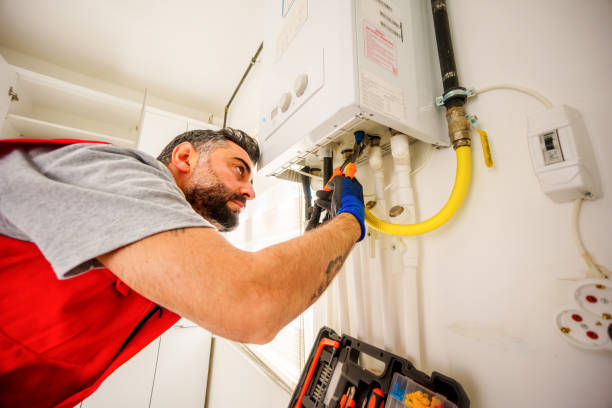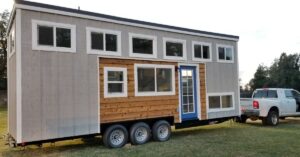
Middle-aged, bearded man repair gas boiler with wrenches, Gas Heating Boiler Service At Home
Yes, there are scams, but not many will give you a free like-for-like new gas boiler. The UK government has turned hard in the direction of decarbonization, and that means if you’re expecting a free like-for-like new gas boiler, you’re roughly five years behind policy reality.
What is available now? Income-tested boiler assistance and low-carbon heating grants, both contingent. Here’s what really works in 2025.
The Three Schemes That Count
Cut through the marketing hype. Three schemes now dominate government boiler grants, all for slightly different motives. Knowing which one you qualify for under your circumstances saves you weeks of pointless phone calls.
ECO4: The Poor Person’s Boiler Lifeline
Who it’s for: For households on less than £31,000 or on qualifying benefits. Consider ECO4 as fuel poverty’s safety net. It is for those who can’t possibly afford to replace their heating and takes the form of free or wholly subsidized boiler replacements and loft, cavity, and other insulation. Your boiler is old (8+ years, EPC rating D-G), and your home must be within income levels.
Benefits are Pension Credit, Universal Credit, Child Benefit, Housing Benefit, and other disability benefits. You qualify if you’re a private tenant, but you will require the landlord’s written permission.
Important exclusions:
- Tenants in social housing must apply through their council (alternative funding method)
- End date March 2026
- Boilers can still be insured, but don’t be alarmed if installers approach you to sell heat pumps
| Eligibility Factor | Requirement |
| Income threshold | Under £31,000/year |
| Boiler age | 8+ years old |
| EPC rating | D to G |
| Housing type | Owner-occupied or private rental |
Boiler Upgrade Scheme (BUS): Heat Pumps or Nothing
Homeowners are willing to leave fossil fuels behind. That is where policy teeth are required. BUS provides £7,500 for heat pumps (ground or air) and £5,000 for rural biomass installations, but only if replacing a gas, oil, LPG, or electricity system. No gas-to-gas replacements. Ever.
Homeowners, landlords, and non-domestic properties in England and Wales are eligible. Your property will have to have a valid EPC with no outstanding recommendations on insulation, which catches out more scrupulous applicants than you might imagine. Get the loft and cavity walls fixed up first, or the application’s rubbish.
MCS-accredited installers do the paperwork and get the grant paid directly; it’s taken off your final payment. Easy in theory, bureaucratic in practice.
Why you don’t qualify:
- New builds (constructed after 2020)
- Social housing
- Properties already in receipt of public heating grants
- Urban biomass installations (off-gas rural only)
Warm Homes: Local Grant
Low-income householders require full energy upgrades. Introduced in April 2025, this council program offers up to £30,000 in total upgrades: insulation, heating, and controls. It’s the big brother of ECO4, for homes requiring everything to be replaced at once.
The income limit is about £36,000 a year or means-tested benefits. Your home needs to be rated D-G on its EPC, and you need to be an owner-occupied or a private tenant (again, landlord permission needed).
Catch? Availability is wholly random from council to council. Some have waiting lists; some are first-come, first-served. Ring your own council in person; this is still not nationalized.
How the Application Process Really Works
Stop calling around arbitrary installers on Google. Here’s the application that doesn’t take up your time:
Step 1: Get your EPC rating. No valid certificate = no application. End of story.
Step 2: Check your income proof. Bank statements, benefit letters, P60S; whatever proves you’re under the limit.
Step 3: Choose your scheme:
Earning under £31k and have an old boiler? ECO4.
Want a heat pump and can afford part costs? BUS.
Insulation and heating required? Warm Homes: Local Grant.
Step 4: Ring an accredited installer (ECO4/BUS) or local council (Warm Homes). Don’t use middleman “grant finding” companies; they charge referral fees.
Step 5: Home survey. An energy assessor visits your home, determines eligibility, and recommends specific upgrades.
Step 6: Installation, pending final approval.
How long from the installation application? 8-16 weeks, depending on backlogs of installers and council processing times.
What No One Tells You About These Schemes
Gas boilers are being phased out. ECO4 might still fund one if you’re in a need case and off-grid, but you’ll be prompted by installers to have a heat pump instead. Government policy actively favors low-carbon systems these days.
You can’t double-dip. Receive ECO4 funding for a boiler? You can’t receive the BUS for the same improvement. Schemes are intentionally mutually exclusive.
Social housing operates differently. Council and housing association tenants can’t access ECO4 directly; your landlord applies through separate public funding streams. Don’t waste time calling installers; escalate through your tenancy officer.
Landlords can claim, but tenants benefit. Private landlords qualify for BUS grants when upgrading rental properties. Tenant consent isn’t required, but eviction-for-renovation rules still apply.
EPC advice is not advice. That “improve loft insulation” remark on your certificate? It stops BUS applications until remedied. Do that first.
Regional Exceptions You Need to Know About
England dominates scheme availability, but Scotland, Wales, and Northern Ireland run simultaneous programs with other titles and cut-offs:
- Scotland: Warmer Homes Scotland (similar to ECO4)
- Wales: Nest scheme (means-tested, boiler grants available)
- Northern Ireland: Affordable Warmth Scheme
Search for your local energy advice service; the postcode determines which scheme is applicable.
The Numbers That Matter
| Scheme | Max Funding | Income Limit | Housing Type |
| ECO4 | Full boiler cost | Under £31,000 | Owner/private tenant |
| BUS | £7,500 (heat pump) | None | Owner/landlord |
| Warm Homes: Local | Up to £30,000 | ~£36,000 | Owner/private tenant |
Do You Even Need a Gas Boiler in 2025?
Straight answer? Doubtful. Running expenses of heat pumps have dropped below gas in the majority of locations; £800-£1,200 annually versus £1,000-£1,500 for gas systems. The installation cost remains greater (£8,000-£14,000 for heat pumps versus £2,000-£4,000 for gas), but grants pay for that extra cost.
Gas boiler bans on new-builds started in 2025. Extend bans on replacements by 2030. Putting gas in today equates to putting it in again in ten years; expensive planning.
Heat pumps work. The “they don’t heat buildings properly” myth died sometime in 2022 when the quality of installation improved. Contemporary systems will get flow temperatures up to 55°C, adequate for most UK housing stock if radiators are properly sized.
Final Thoughts
There are government boiler schemes, but they’re policy measures, not customer care. ECO4 is for fuel-poor households. BUS is driving the adoption of heat pumps. Warm Homes: Local Grant covers the cost of full retrofits.
Free money? Get the eligibility criteria exact, record everything, and have accredited installers only. The system favors planning, not winging it.
Gas boilers are still on the table through ECO4 for now, but anticipate that window to shut by 2026. If you’re ready for a heating upgrade, align with where policy is headed, not where it’s been.



